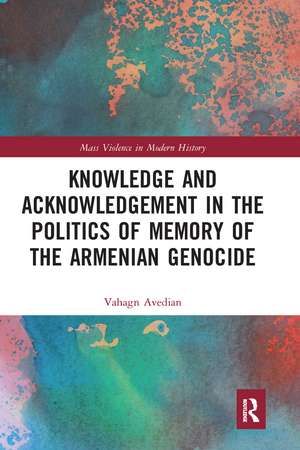Knowledge and Acknowledgement in the Politics of Memory of the Armenian Genocide: Mass Violence in Modern History
Autor Vahagn Avedianen Limba Engleză Paperback – 30 iun 2020
The politics of memory is an intricate and interdisciplinary negotiation, engaging many different actors in the society who have access to a wide range of resources and measures in order to achieve their goals. By following the Armenian question during the past century up to its Centennial Commemoration in 2015, this study aims to explain why and how the politics of memory of the Armenian Genocide has kept it as a topical issue in our days.
| Toate formatele și edițiile | Preț | Express |
|---|---|---|
| Paperback (1) | 389.11 lei 6-8 săpt. | |
| Taylor & Francis – 30 iun 2020 | 389.11 lei 6-8 săpt. | |
| Hardback (1) | 766.38 lei 6-8 săpt. | |
| Taylor & Francis – 30 oct 2018 | 766.38 lei 6-8 săpt. |
Preț: 389.11 lei
Nou
Puncte Express: 584
Preț estimativ în valută:
74.46€ • 79.62$ • 62.08£
74.46€ • 79.62$ • 62.08£
Carte tipărită la comandă
Livrare economică 17 aprilie-01 mai
Preluare comenzi: 021 569.72.76
Specificații
ISBN-13: 9780367584580
ISBN-10: 0367584581
Pagini: 312
Dimensiuni: 156 x 234 x 17 mm
Greutate: 0.44 kg
Ediția:1
Editura: Taylor & Francis
Colecția Routledge
Seria Mass Violence in Modern History
Locul publicării:Oxford, United Kingdom
ISBN-10: 0367584581
Pagini: 312
Dimensiuni: 156 x 234 x 17 mm
Greutate: 0.44 kg
Ediția:1
Editura: Taylor & Francis
Colecția Routledge
Seria Mass Violence in Modern History
Locul publicării:Oxford, United Kingdom
Public țintă
PostgraduateCuprins
Contents;Acknowledgements;Introduction ;The Vitality of the Armenian Genocide: Why is it Still Topical? ;Genocide Studies: A True Interdisciplinary Field and its Challenges;Politics of Memory: An Intricate Perpetual Process;Politics of Memory Explained through its Constituent Parts;Memory and History in the Politics of Memory;Creating National Narrative and Identity;Molding the Memory by Forgetting;The Reciprocal Relation between Democracy and Memory;Education: An Example of Auxiliary Means in Politics of Memory;The Central Role of Law and Justice;Reconciliation: Synthesis of Recognition, Responsibility and Reparation ;Existing Research;Outline and Delimitations;The Armenian Question between History and Politics ;The Entry of the Armenian Question into the International Arena;Beacons of Hope and Justice: The Sèvres Treaty;From Sèvres to Lausanne: Realpolitik Reigns Supreme;Genocide in International Law: Nuremberg and the UN Convention ;The Turkish Genocide Denial during the Interwar Period;The Reawakening: The 50th Commemoration Day on April 24, 1965 ;The Resonance: The Diaspora as Agent of Remembrance and Recognition ;The Rediscovery of the Suppressed Genocide ;The Igniting Spark: The Genocide Survivor Gourgen Yanikian;The First UN Genocide Study: The Ruhashyankiko Report, 1979;The Iron Ladle: Armed Terrorism as Political Leverage;The Entry into the Academia;Which Memory to Preserve: The US Holocaust Memorial Museum;Hearing the Neglected Victim: The Permanent Peoples’ Tribunal, 1984;The UN Genocide Convention Revisited: The Whitaker Report, 1985 ;The Pinnacle of the Recognition Process: European Parliament, 1987 ;Memory, History and Justice: Towards Reconciliation ;The Karabakh Conflict: The Legacy Turned Catalyst for Independence ;Independence and the Genocide as Rule Setter;Armenian-Turkish Relations and the Old Ghost of Genocide;Parliamentary Recognitions: Writing History or Confirming the Research? ;Legal Examination: Law and Politics;The Unforgotten Genocide: The Centennial Commemoration, 2015;Knowledge and (Dis)Acknowledgement: A Century of the Politics of Memory of the Armenian Genocide ; Bibliography ;Index
Notă biografică
Vahagn Avedian is the editor of Armenica.org and Genocide1915.org. The current publication is a modified version of his Ph.D. thesis at the History Department, Lund University.
Descriere
By following the politics of memory of the Armenian question during the past century, this study aims to explain why the issue is still topical in our days.










